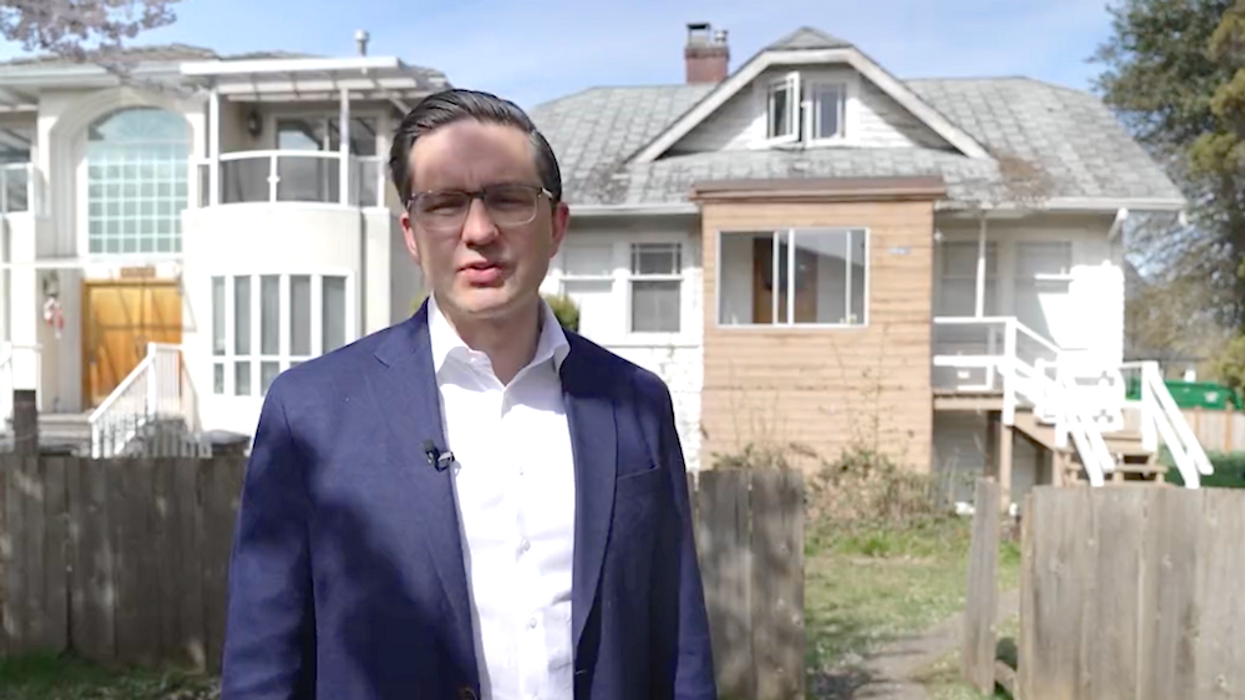Pierre Poilievre won the Progressive Conservative leadership race on Saturday in a convincing fashion, and now, as the leader of the official opposition, he hopes to start bringing his plans for Canada to fruition. During his campaign, Poilievre touched on a wide range of topics from climate change to "restoring Canadian values," but one issue that remained at the forefront was the price of housing in Canada.
Poilievre repeatedly denounced municipal "gatekeepers" who he says are responsible for rapidly growing home prices. In April, he tweeted a nearly five minute video lamenting the $4.8 million price tag that had been placed on a dilapidated Vancouver home, taking aim at the Vancouver government's alleged focus on protecting wealthy investors. Of note, both Polievre and his wife Anaida have investment rental properties -- something he has faced criticism over.
In his acceptance speech over the weekend, Poilievre stated that "we need to restore the hope of home ownership," adding that "youths and newcomers can’t get a home because local government gatekeepers block housing with heavy fees and long delays for building permits, leaving us with the fewest houses per capita out of any country [in] the G7, even though we have the most land to build on."
Although Poilievre has yet to release a detailed platform -- something that will likely come during the next federal election -- he has voiced support for various housing measures in the past, and has brought forward several ideas that he says will fix Canada's housing crisis.
Reduce Building Permit Fees and Processing Time
Like many other political leaders, Poilievre has held up increased construction as the key to solving Canada's housing problem. During his speech on Saturday, Poilievre said that if elected Prime Minister, he would require big cities to speed up the processing time for building permits and lower their associated costs. He would enforce this by withholding federal infrastructure funding from those who do not comply. This wasn't a new talking point for Poilievre, having previously said that big cities would need to increase homebuilding by 15% or face having a portion of the federal funding withheld.
This plan is very similar to Ontario's More Homes For Everyone Act supported by Premier Doug Ford, which places an emphasis on incentivizing municipalities to make timelier decisions on development and rezoning applications. The "incentives" also come in the form of reduced funding via lost application fees.
Poilievre joins others like Prime Minister Justin Trudeau in supporting ramped up home construction -- in fact, Trudeau has committed $7.5 billion towards it. But even if Canadian cities were to begin approving permits more quickly, many have questioned whether there are enough workers for construction to keep pace. A recent report from Ottawa-based think tank Smart Prosperity Institute that analyzed Ontario's goal of building 1.5 million new homes over the next 10 years found that current construction capacity would fall short by more then 500,000 homes.
To incentivize building, Poilievre has said he will create a building bonus that pays municipalities $10,000 dollars for every extra home built. He has also said he would "bring penalties for big city governments" for "egregious cases of NIMBYism and gatekeeping."
Build More Affordable, Transit-Oriented Communities
Also during his remarks after winning the PC leadership, Poilievre said that he would require municipalities to "approve affordable housing around all transit stations." This move, he says, will allow young people to live there without the added expenses of owning a car. Previously, Poilievre had said this would be accomplished by requiring municipalities that are seeking federal funds for major transportation projects to pre-approve building permits for high-density housing on all available land around the stations.
Increase Density
In addition to creating high-density housing around transit, Poilievre has voiced support for several density-increasing measures in low-density areas. During a press conference in Toronto earlier this year, he said that his housing plan would involve densifying neighbourhoods that were traditionally for single-family homes. This includes encouraging basement suites, which he said would provide additional income for homeowners as well as housing for students. He also supported replacing single-family homes with multi-unit buildings in "appropriate" areas.
Sell Off Underutilized Federal Buildings
Poilievre noted during his speech that he plans to "sell off 15% of the underutilized federal buildings to turn them into housing." The proceeds of these sales, Poilievre said, would be used to reduce Canada's deficit, adding "in other words: stop print money, start building homes for our people."
No details have been released on which buildings would be sold, or what kind of housing would be built there (ie. rental or condo, market rate or affordable, what determinate of "affordable" would be used, etc.).
Fire Bank of Canada's Governor and Target Inflation
Poilievre has repeatedly taken aim at both the Bank of Canada and Trudeau over the country's sky-high inflation rate -- or as Poilievre likes to call it, Justinflation -- noting that inflationary pricing has made essentials like housing even more unaffordable. During a leadership debate in May of this year, Poilievre said he would replace Bank of Canada Governor Tiff Macklem with someone who would protect Canadian's purchasing power.
The Conservative leader has also called the Bank of Canada "financially illiterate," and has promised to increase oversight of the bank. He has also accused the central bank of funding Trudeau's shortcomings during the pandemic through it's bond purchasing program -- something he says has bolstered inflation and worsened the housing affordability crisis. Economists, however, have disagreed with this take.
Poilievre has also accused the Bank of Canada of printing cash to fund the federal government, which the bank has refuted.





















